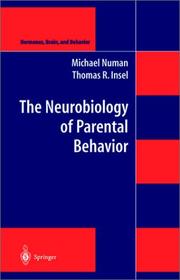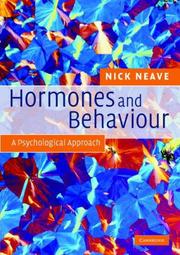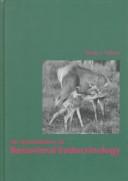| Listing 1 - 7 of 7 |
Sort by
|

ISBN: 1280188294 9786610188291 0387217991 038700498X Year: 2003 Publisher: New York : Springer-Science+Business Media,
Abstract | Keywords | Export | Availability | Bookmark
 Loading...
Loading...Choose an application
- Reference Manager
- EndNote
- RefWorks (Direct export to RefWorks)
In addition to filling a need within the field of parental behavior, this book contributes importantly to the growing area of emotional and motivational neuroscience. A major part of neuroscience research at the whole organism level has been focused on cognitive neuroscience, with an emphasis on the neurobiology of learning and memory, but there has been a recent upsurge in research which is attempting to define the neural basis of basic motivational and emotional systems which regulate such behaviors as food intake, aggression, reproduction, reward-seeking behaviors, and anxiety-related behaviors. In this book the emphasis is on the research findings obtained from rodents, sheep and primates. The authors' goal, of course, was to provide a foundation that may help us understand the neurobiology of human parental behavior. Indeed, the last chapter attempts to integrate the non-human research data with some human data in order to make some inroads toward an understanding of postpartum depression, child abuse, and child neglect. Clearly, motivational and emotional neuroscience has close ties to psychiatry, and this connection will be very evident in the final chapter. By understanding the neurobiology of parental behavior we are also delving into neurobiological factors which may have an impact on core human characteristics involved in sociality, social attachment, nurturing behavior, and love. In this very violent world, it is hard to conceive of a group of characteristics that are more worthy of study.
Parental behavior in animals. --- Animal behavior --- Endocrine aspects. --- Neurobiology. --- Neurosciences. --- Animal behavior. --- Behavioral Sciences. --- Behavioral sciences. --- Neural sciences --- Neurological sciences --- Neuroscience --- Medical sciences --- Nervous system --- Neurosciences --- Animal behavioral endocrinology --- Animal hormone-behavior relationships --- Behavioral endocrinology, Animal --- Hormonal aspects of animal behavior --- Hormone-behavior relationships, Animal --- Interactions, Animal hormone-behavior --- Relationships, Animal hormone-behavior --- Endocrinology --- Hormonal aspects

ISBN: 0262025116 9780262025119 Year: 2002 Publisher: Cambridge (Mass.): MIT press
Abstract | Keywords | Export | Availability | Bookmark
 Loading...
Loading...Choose an application
- Reference Manager
- EndNote
- RefWorks (Direct export to RefWorks)
Psychoneuroendocrinology --- #PBIB:2002.3 --- Endocrinology --- Neuropsychoendocrinology --- Psychoendocrinology --- Neuroendocrinology --- Neuropsychology --- Psychosomatic aspects --- Animal behavior --- Human behavior --- Behavior --- Hormones --- Psychophysiology. --- Endocrine aspects. --- drug effects. --- metabolism. --- Behavioral endocrinology, Human --- Hormone-behavior relationships, Human --- Hormonal aspects of human behavior --- Human behavioral endocrinology --- Human hormone-behavior relationships --- Interactions, Human hormone-behavior --- Relationships, Human hormone-behavior --- Animal behavioral endocrinology --- Animal hormone-behavior relationships --- Behavioral endocrinology, Animal --- Hormonal aspects of animal behavior --- Hormone-behavior relationships, Animal --- Interactions, Animal hormone-behavior --- Relationships, Animal hormone-behavior --- Endocrine aspects --- Hormonal aspects

ISBN: 9780511808203 9780521871457 9780521692014 0511808208 9780511649547 0511649541 052187145X 0521692016 0511573669 9780511573668 1107180341 0511645457 9786612390029 1282390023 0511376197 0511377134 Year: 2008 Publisher: Cambridge Cambridge University Press
Abstract | Keywords | Export | Availability | Bookmark
 Loading...
Loading...Choose an application
- Reference Manager
- EndNote
- RefWorks (Direct export to RefWorks)
Recent advances in non-invasive sampling techniques have led to an increase in the study of hormones and behaviour. Behaviour is complex but can be explained to a large degree by interactions between various psychological and physiological components, such as the interplay between hormonal and psychological systems. This new textbook from Nick Neave offers a detailed introduction to the fascinating science of behavioural endocrinology from a psychological perspective, examining the relationships between hormones and behaviour in both humans and animals. Neave explains the endocrine system and the ways in which hormones can influence brain structure and function, and presents a series of examples to demonstrate how hormones can influence specific behaviours, including sexual determination and differentiation, neurological differentiation, parental behaviours, aggressive behaviours and cognition. This introductory textbook will appeal to second and third year social science undergraduate students in psychology and biomedicine.
Psychoneuroendocrinology. --- Hormones --- Human behavior --- Animal behavior --- Animal behavioral endocrinology --- Animal hormone-behavior relationships --- Behavioral endocrinology, Animal --- Hormonal aspects of animal behavior --- Hormone-behavior relationships, Animal --- Interactions, Animal hormone-behavior --- Relationships, Animal hormone-behavior --- Endocrinology --- Behavioral endocrinology, Human --- Hormone-behavior relationships, Human --- Hormonal aspects of human behavior --- Human behavioral endocrinology --- Human hormone-behavior relationships --- Interactions, Human hormone-behavior --- Relationships, Human hormone-behavior --- Neuropsychoendocrinology --- Psychoendocrinology --- Neuroendocrinology --- Neuropsychology --- Physiological effect. --- Endocrine aspects. --- Hormonal aspects --- Psychosomatic aspects --- Health Sciences --- Psychiatry & Psychology
Book
ISBN: 0128151617 0128151609 9780128151617 9780128151600 Year: 2021 Publisher: Amsterdam, Netherlands : Academic Press,
Abstract | Keywords | Export | Availability | Bookmark
 Loading...
Loading...Choose an application
- Reference Manager
- EndNote
- RefWorks (Direct export to RefWorks)
Animal behavior --- Animal communication. --- Endocrine disrupting chemicals. --- Endocrine aspects. --- Disrupters, Endocrine --- Disrupting chemicals, Endocrine --- Disruptors, Endocrine --- EDCs (Endocrine disrupting chemicals) --- Endocrine disrupters --- Endocrine disrupting compounds --- Endocrine disruptors --- Environmental endocrine disrupters --- Environmental endocrine disrupting chemicals --- Environmental endocrine disruptors --- Hormone disruptors --- Pollutants --- Animal biocommunication --- Animal language --- Biocommunication, Animal --- Language learning by animals --- Animal behavioral endocrinology --- Animal hormone-behavior relationships --- Behavioral endocrinology, Animal --- Hormonal aspects of animal behavior --- Hormone-behavior relationships, Animal --- Interactions, Animal hormone-behavior --- Relationships, Animal hormone-behavior --- Endocrinology --- Hormonal aspects

ISBN: 0691092478 069109246X 1400850770 9781400850778 9780691092461 9780691092478 Year: 2005 Publisher: Princeton, N.J. Princeton University Press
Abstract | Keywords | Export | Availability | Bookmark
 Loading...
Loading...Choose an application
- Reference Manager
- EndNote
- RefWorks (Direct export to RefWorks)
Research into the lives of animals in their natural environments has revealed a rich tapestry of complex social relationships and previously unsuspected social and mating systems. The evolution of this behavior is increasingly well understood. At the same time, laboratory scientists have made significant discoveries about how steroid and peptide hormones act on the nervous system to shape behavior. An exciting and rapidly progressing hybrid zone has developed in which these two fields are integrated, providing a fuller understanding of social behavior and the adaptive functions of hormones. This book is a guide to these fascinating connections between animal social behavior and steroid and peptide hormones--a synthesis designed to make it easier for graduate students and researchers to appreciate the excitement, engage in such integrative thinking, and understand the primary literature. Throughout, Elizabeth Adkins-Regan emphasizes concepts and principles, hypothesis testing, and critical thinking. She raises unanswered questions, providing an unparalleled source of ideas for future research. The chapter sequence is by levels of biological organization, beginning with the behavior and hormones of individuals, proceeding to social relationships and systems, and from there to development, behavioral evolution over relatively short time scales, life histories and their evolution, and finally evolution over longer time scales. The book features studies of a wide variety of wild and domestic vertebrates along with some of the most important invertebrate discoveries.
Animal biochemistry --- Animal ethology and ecology. Sociobiology --- Social behavior in animals. --- Animal behavior --- Comportement social chez les animaux --- Animaux --- Endocrine aspects. --- Moeurs et comportement --- Aspect endocrinien --- Animal behavioral endocrinology --- Animal hormone-behavior relationships --- Behavioral endocrinology, Animal --- Hormonal aspects of animal behavior --- Hormone-behavior relationships, Animal --- Interactions, Animal hormone-behavior --- Relationships, Animal hormone-behavior --- Hormonal aspects --- Hormones. --- Behavior, Animal. --- Animal Behavior --- Animal Behaviors --- Behaviors, Animal --- Ethology --- Hormone --- Hormone Receptor Agonists --- Agonists, Hormone Receptor --- Receptor Agonists, Hormone --- Endocrine Glands --- Endocrinology --- Animal societies --- Animals --- Animals, Habits and behavior of --- Behavior, Animal --- Animal psychology --- Zoology --- Ethologists --- Psychology, Comparative --- Catecholamines --- Endocrine glands --- Secretion --- Behavior

ISBN: 0878936173 9780878936175 0878936181 Year: 2005 Publisher: Sunderland Sinauer Associates
Abstract | Keywords | Export | Availability | Bookmark
 Loading...
Loading...Choose an application
- Reference Manager
- EndNote
- RefWorks (Direct export to RefWorks)
Animal biochemistry --- Animal ethology and ecology. Sociobiology --- Animal behavior --- Human behavior --- Animaux --- Comportement humain --- Endocrine aspects --- Moeurs et comportement --- Aspect endocrinien --- 591.5 --- Animal habits. Animal behaviour. Ecology. Ethology. Animal and environment. Bionomy --- 591.5 Animal habits. Animal behaviour. Ecology. Ethology. Animal and environment. Bionomy --- Behavioral endocrinology, Human --- Hormone-behavior relationships, Human --- Hormonal aspects of human behavior --- Human behavioral endocrinology --- Human hormone-behavior relationships --- Interactions, Human hormone-behavior --- Relationships, Human hormone-behavior --- Endocrinology --- Animal behavioral endocrinology --- Animal hormone-behavior relationships --- Behavioral endocrinology, Animal --- Hormonal aspects of animal behavior --- Hormone-behavior relationships, Animal --- Interactions, Animal hormone-behavior --- Relationships, Animal hormone-behavior --- Hormonal aspects

ISBN: 0878936157 9780878936151 Year: 1995 Publisher: Sunderland Sinauer Associates
Abstract | Keywords | Export | Availability | Bookmark
 Loading...
Loading...Choose an application
- Reference Manager
- EndNote
- RefWorks (Direct export to RefWorks)
Hormones --- Physiology, Comparative --- Psychoneuroendocrinology --- Physiological effect --- 577.175.2/.7 --- 612.43 --- 591.166 --- 591.56 --- -Physiology, Comparative --- #ABIB:aeco --- Comparative physiology --- Medicine, Comparative --- Zoology --- Catecholamines --- Endocrine glands --- Endocrinology --- Secretion --- Neuropsychoendocrinology --- Psychoendocrinology --- Neuroendocrinology --- Neuropsychology --- Animal hormones --- Endocrine physiology. Internal secretions. Ductless glands. Hormones. Endocrinology --- Gonochorism. Differentiation of sexes. Sexual reproduction in general --- Provision for posterity. Care of young. Brood care --- Psychosomatic aspects --- Animal behavior --- Human behavior --- Behavior --- Psychophysiology. --- Zoology and Animal Sciences. Zoology --- Endocrine aspects. --- physiology. --- Animal Physiology and Biochemistry --- Endocrinology. --- 591.56 Provision for posterity. Care of young. Brood care --- 591.166 Gonochorism. Differentiation of sexes. Sexual reproduction in general --- 612.43 Endocrine physiology. Internal secretions. Ductless glands. Hormones. Endocrinology --- 577.175.2/.7 Animal hormones --- Behavioral endocrinology, Human --- Hormone-behavior relationships, Human --- Hormonal aspects of human behavior --- Human behavioral endocrinology --- Human hormone-behavior relationships --- Interactions, Human hormone-behavior --- Relationships, Human hormone-behavior --- Animal behavioral endocrinology --- Animal hormone-behavior relationships --- Behavioral endocrinology, Animal --- Hormonal aspects of animal behavior --- Hormone-behavior relationships, Animal --- Interactions, Animal hormone-behavior --- Relationships, Animal hormone-behavior --- Endocrine aspects --- Hormonal aspects --- Physiology. --- Hormones - Physiological effect
| Listing 1 - 7 of 7 |
Sort by
|

 Search
Search Feedback
Feedback About UniCat
About UniCat  Help
Help News
News